In 1927 the studio became involved in major controversy during the Lohmann Affair when it emerged that the company had secretly been granted a large sum from the German Navy Department geared toward military propaganda and support of rearmament at a time when this was forbidden by the Treaty of Versailles. The ensuing scandal led to a political crisis in the Weimar Republic and the resignation of Otto Gessler as Defence Minister.
The company went bankrupt in the wake of the scandal. In 1928 the Munich-based Bavaria Film bought up the remaining assets of the company. Its former production chief Ernst Hugo Correll was appointed as the new head of Germany's largest company UFA.
Six films

German postcard by Ross Verlag, no. 577/1. Photo: Leo Klaude, Berlin / Phoebus-Film. Luciano Albertini in Der Sieg des Maharadscha/The victory of the Maharajah (Joseph Delmont, 1923).

German postcard by Ross Verlag, no. 577/2. Photo: Leo Klaude, Berlin / Phoebus Film. Luciano Albertini in Die Schlucht des Todes/The Ravine of Death (Luciano Albertini, Francis A. Bertoni, 1923).
Luciano Albertini (1882-1945) was a beloved strongman of the Italian and German silent cinema. From his arrival in Germany in 1921 until 1924, all of Albertini's films were distributed by Phoebus and produced by his own Albertini-Film. In Die Schlucht des Todes (Luciano Albertini, Francis Bertoni, 1923), Albertini plays an Argentine farmer whose reckless deeds at the Devil's Canyon convince an Italian circus director to engage him and his wife (Lya De Putti). The wife becomes enamoured with a womanising count and elopes with him.
Years after, Luciano has become a dockworker in Naples and saves a child, unknowing it is the child of Lya and the count. The count is fed up with Lya. She runs into Luciano and begs him to go back with her to Argentine. Back there he finds out she has a child and recognises it as the girl he once saved. Galloping towards the Devil's Canyon, his horse is cleverer than he and holds back. Lya gallops behind him but she falls down a cliff, so Luciano rescues her and they reunite.
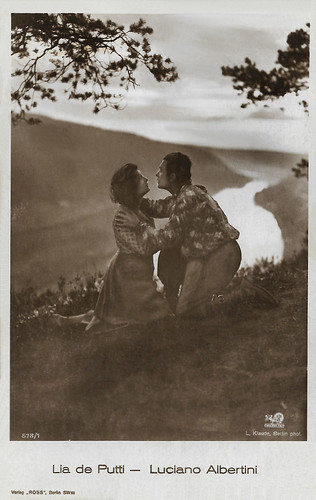
German postcard by Ross Verlag, Berlin, no. 578/1, 1919-1924. Photo: Leo Klaude, Berlin / Phoebus Film. Lya de Putti and Luciano Albertini in Die Schlucht des Todes/The Ravine of Death (Luciano Albertini, Albert-Francis Bertoni, Max Obal, 1923). The final scene: Luciano has just saved Lya from falling down the Devil's Canyon and reconciles with her after his refusal to acknowledge her illegal child and his failed suicide attempt.
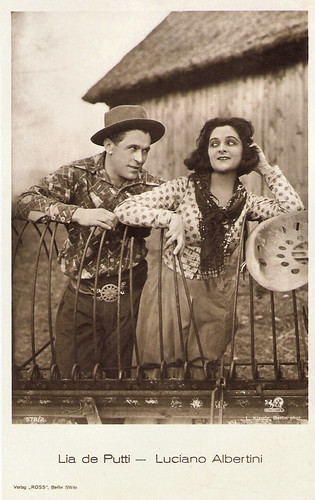
German postcard by Ross Verlag, Berlin, no. 578/2, 1919-1924. Photo: Leo Klaude, Berlin / Phoebus Film. Luciano Albertini and Lya de Putti in Die Schlucht des Todes/The Ravine of Death (Luciano Albertini, Albert-Francis Bertoni, Max Obal, 1923).
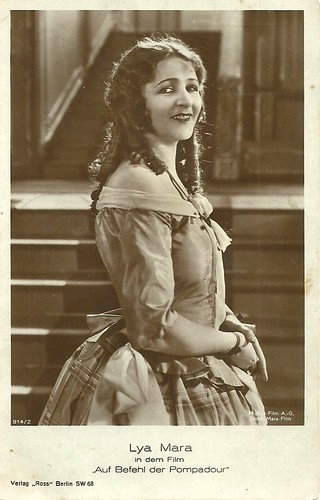
German postcard by Ross Verlag, no. 914/2, 1925-1926. Photo: Phoebus Film / Zelnik-Mara Film. Lya Mara in Auf Befehl der Pompadour/By Order of Pompadour (Friedrich Zelnik, 1924).
Lya Mara was the star and her partner Friedrich a.k.a. Frederic Zelnik the director of Auf Befehl der Pompadour/By Order of Pompadour (1924), situated in the France of the present time and then at the time of Louis XV, in the 18th century. The film was produced by their own company, Zelnik-Mara Film and distributed by Phoebus-Film. Ross Verlag published a wonderful series of postcards for the film, focusing on Mara as Madame de Pompadour.

German postcard by Ross Verlag, no. 914/3, 1925-1926. Photo: Phoebus Film / Zelnik-Mara Film. Lya Mara in Auf Befehl der Pompadour/By Order of Pompadour (Friedrich Zelnik, 1924).
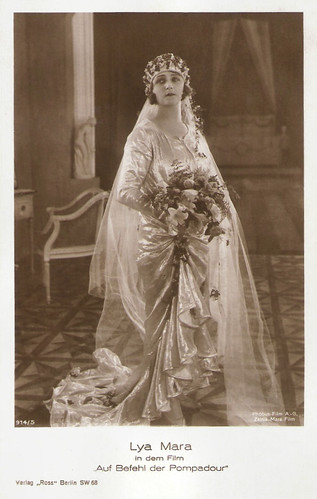
German postcard by Ross Verlag, no. 914/5, 1925-1926. Photo: Phoebus Film / Zelnik-Mara Film. Lya Mara in Auf Befehl der Pompadour/By Order of Pompadour (Friedrich Zelnik, 1924).
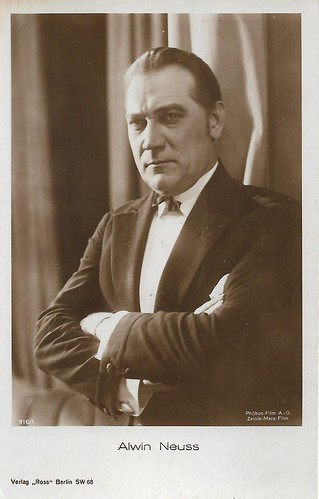
German postcard by Ross Verlag, no. 916/4, 1925-1926. Photo: Phoebus-Film AG / Zelnik-Mara Film. Alwin Neuss.

German postcard by Ross Verlag. Photo: Phoebus Film. Maria Solveg and Gustav Fröhlich in Der Meister von Nürnberg (Ludwig Berger, 1927).
The historical comedy Der Meister von Nürnberg/The Master of Nuremberg (Ludwig Berger, 1927) was based on Richard Wagner's opera 'Die Meistersinger von Nürnberg'. Rudolf Rittner played the title figure and Maria Solveg and Gustav Fröhlich starred as the young lovers. Phoebus-Film was both producer and distributor of the film. Ross Verlag made a beautiful series of sepia postcards.

German postcard by Ross Verlag. Photo: Phoebus Film. Maria Solveg in Der Meister von Nürnberg (Ludwig Berger, 1927).
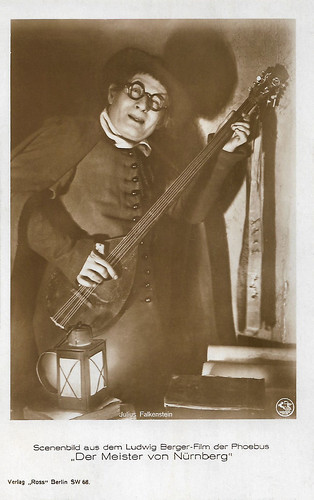
German postcard by Ross Verlag. Photo: Phoebus Film. Julius Falkenstein in Der Meister von Nürnberg (Ludwig Berger, 1927).

German postcard by Verlag Hermann Leiser, Berlin, no. 6282. Photo: Phoebus-Film. Elisabeth Bergner in Liebe/ Love (Paul Czinner, 1926).
The historical drama Liebe/Love (Paul Czinner, 1927) is based on the novel 'La Duchesse de Langeais' (1834) by Honoré de Balzac. While the novel was published in 1834, Bergner's costume and hairdo rather remind us of the 1860s.

German postcard by Ross Verlag, no. 1655/2, 1927-1928. Photo: Phoebus-Film. Elisabeth Bergner in Liebe/Love (Paul Czinner, 1927). Collection: Marlene Pilaete.

German postcard by Ross Verlag, Berlin, no. 3220/3, 1928-1929. Photo: Phoebus-Film. Lya de Putti in Charlott ertwas verrückt/Charlott a little crazy (Adolf E. Licho, 1929). Collection: Didier Hanson.
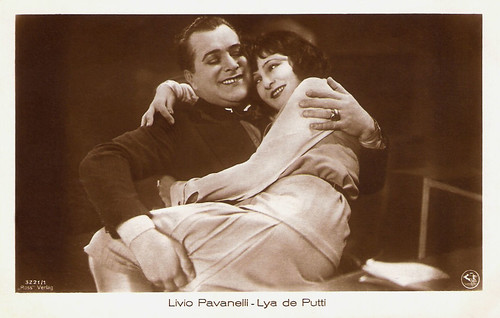
German postcard by Ross Verlag, no. 3221/1, 1928-1929. Photo: Phoebus-Film. Livio Pavanelli and Lya de Putti in Charlott etwas verrückt/Charlott a little crazy (Adolf E. Licho, 1929).
MGM Stars

German postcard by Ross Verlag, Berlin, no. 1036/1, 1927-1928. Photo: Phoebus Film. Ramon Novarro in Scaramouche (Rex Ingram, 1923).

German postcard by Ross Verlag, Berlin, no. 1036/2, 1927-1928. Photo: Bragaglia / Phoebus Film. Ramon Novarro in Ben-Hur: A Tale of the Christ (Fred Niblo, 1925).

German postcard by Ross Verlag, Berlin, no. 1041/1, 1927-1928. Photo: Phoebus Film. Antonio Moreno.
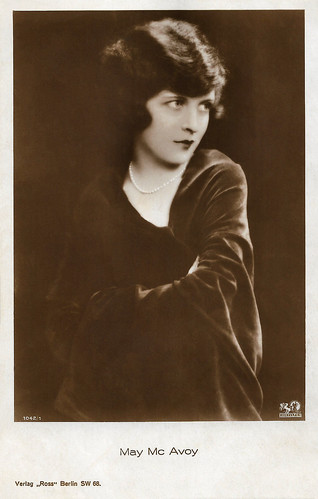
German postcard by Ross Verlag, Berlin, no. 1042/1, 1927-1928. Photo: Phoebus Film. May McAvoy.
Vom Werden Deutscher Filmkunst - Der Stumme Film

German collectors card by Ross Verlag in the series Vom Werden Deutscher Filmkunst - Der Stumme Film, no. 129. Photo: Phoebus-Film. Publicity still with Luciano Albertini in Der Mann auf dem Kometen/The Man on the Comet (Alfred Halm, 1925).

German collectors card by Ross Verlag in the series Vom Werden deutscher Filmkunst - Der Stumme Film, picture no. 114, group 39. Photo: Ufa. Maria Solveg in Der Meister von Nürnberg/The Master of Nuremberg (Ludwig Berger, 1927).
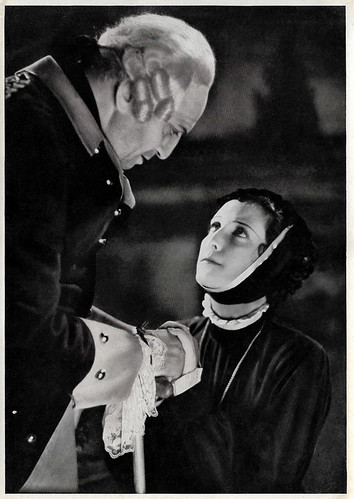
German collectors card in the series 'Vom Werden deutscher Filmkunst - Der Tonfilm', album no. 11, picture no. 112. Photo: Phoebus-Film / Ross Verlag. Theodor Loos and Dorothea Wieck in Trenck - Der Roman einer großen Liebe/Trenck (Ernst Neubach, Heinz Paul, 1932).
Sources: Wikipedia and IMDb.
No comments:
Post a Comment